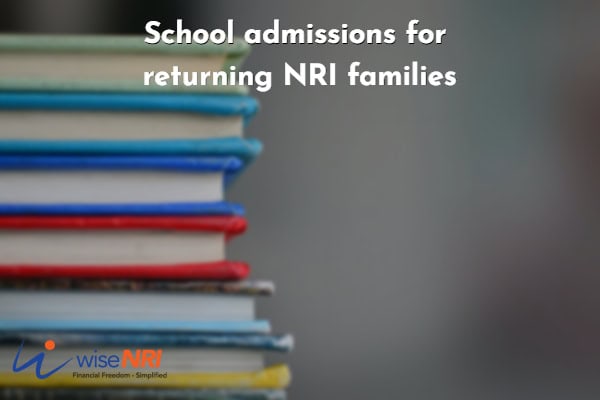Many Non-Resident Indians (NRIs) choose to return to India due to various factors such as professional opportunities, family commitments, and a desire to reconnect with their roots and culture. Amidst the many adjustments that come with relocating, one critical aspect for returning families is ensuring a seamless and quality education for their children. We share some insights into the Indian schooling system and a suitable way to apply to the school that suits your best interests.

Read – Child Higher Education – Things NRIs should consider
Schooling for returning NRI families
The Indian education system is broadly divided into four levels: Pre-primary (ages 3-6), Primary (1st-5th grades), Secondary (6th-12th grades), and Higher Secondary or College (undergraduate and postgraduate levels). Schools in India offer curricula based on national education boards like CBSE/ICSE, the state board based on the state where the school is located, and international boards like IB and Cambridge. You have to decide the curriculum that you want for your child. Moving across boards is challenging for a student, more so for a person who has been in a foreign country and a different cultural context.
There is a variety of schooling options, especially in urban India, that cater to various preferences and affordability. Some of the factors that you should consider while selecting a school include the school’s philosophy, proximity to your home, curriculum, extracurricular activities, faculty quality, and fees. If your child has been in one school for many years, you might want to choose a school that is similar so that they can adjust better. You might want to consider schools that have a cohort of students who have moved back to India. The school will have the expertise and experience to provide support and understanding, and your child will have peers with similar experiences. Traffic conditions, weather, education system, interactions with students, etc. will be different and the students will need time and support from parents and teachers to adapt to the change. Children might have to study languages that they would not have studied and given exams for. They need time and assistance to get to the level of their peers.
Read – Problems and challenges faced by NRI students
Competition in Schools
Competition in India is tough. The demand for admission to quality schools is high and the number of seats is limited. Most parents in India do not think of getting their child out of the school they are in till they graduate from the 10th or 12th standard. Also, the higher the grade/standard, the more difficult it is to get admission. Moreover, mid-term or mid-year admission is difficult. Typically, timely responses are not given to online admission enquiries, and it might be better to visit the school in person to enquire about admission and take the process ahead. For instance, one of our clients sent numerous emails to a prestigious international school in Mumbai with a good online presence only to get no response. It is crucial to start the enquiry process as per the timeline of the school’s admission process window to avoid last-minute hassles and a smoother admission process.

Check – What should I know about Studying Abroad
The application process can vary from simple to complex. There will be a lot of documentation involved. Some schools might have entrance tests and interviews to decide if your child is a suitable fit for the school. There might be specific admission rules too. For instance, for admission to Class 11, the student should have completed Class 10 from a recognized board. Also, a minimum score is required to choose the desired stream, such as science, commerce, or humanities. It might not be easy to get admission to Class 12, so it is important to plan the move accordingly if possible.
The fee structure for schools in India varies depending on factors such as amenities, campus facilities, and the type of school. Some international schools that cater to international expatriates, diplomats, and others may charge higher fees, often in US dollars. On the other hand, convents, English-medium, or other schools where middle/upper-middle-class families send their children may have a different fee structure. In some cases, if the student has a non-Indian passport, NRI fees might be applicable, increasing the overall cost of education.
Returning to India as an NRI is not easy, especially with family. It involves careful planning across many items, including securing quality education for your children. By thoroughly researching schools, considering key factors such as curriculum, and starting the admission process early, you can ensure a smooth transition and a fulfilling educational experience for your child.
Please share your experience with Indian schooling system in the comment section.

Hi, my son is Indian born and studying in USA in 6th grade. If we return to India, can he join to Indian school after 8th grade
Please define to me what is CLAT India NRI?
What is best school for a girl pursuing education in Caribbean currently. She is finishing 10th standard in May 2025. Looking for college education!
My daughter is 2nd grade I need admission for school